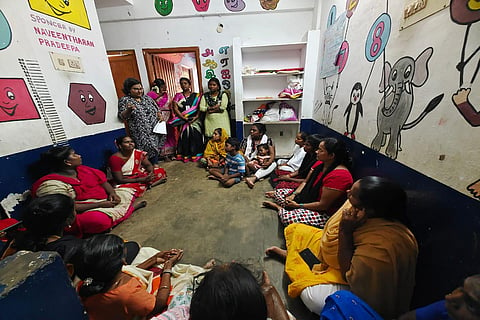

Cecelia (name changed), a 28-year-old single mother who is a domestic worker, takes a bus back home at 9:30 pm every day. Although the bus drops her 500 meters away from the resettlement site in Chengalpattu’s Perumbakkam where she resides, she makes a detour. In an attempt to avoid walking down dark and dingy streets that lead to her residence, she prefers a well-lit main road, adding two extra kilometres to her daily walk. As she nears the resettlement site she quickens her pace, trying to remain unaffected by the catcalling along the way, and climbs a flight of stairs as fast as she can to avoid the men who sit around and use drugs. Despite reaching home safely, Cecelia’s anxiety continues on most days because random men often knock incessantly at her door all night.
Cecelia’s family is among the 18,500 families who were forced to relocate to Perumbakkam, in the fringes of Chennai city, as part of the Tamil Nadu Urban Habitat Development (TNUHD) programme and the Chennai River Restoration Trust’s projects, among others.
A 2016 report outlining the living conditions of the children and women residing in Perumbakkam compiled by the Information and Resource Center for Deprived Urban Communities (IRCDUC) highlighted several safety concerns. “There were instances where men who were undressed knocked on doors at midnight,” the report said. Despite multiple individual and collective petitions being filed with the Grievance Redressal Committee in July 2016, such problems continue to threaten the security of women and children at the resettlement site.
Following inaction, IRCDUC published a second report in January this year, post which a police station became functional. While a few new streetlights were installed, IRCDUC’s women-led team in May, through a mapping project, identified close to 20 dark spots (places with inadequate lighting) and 10 red zones (unsafe zones/crime-prone areas) in resettlement sites of old and new Perumbakkam. Hence, the report details the need for streetlights and high mast lamps in dark spots, along with increased police patrolling in the red zones.
One of the 20 dark spots in Perumbakkam resettelement site.
However, Cecelia pointed out that on most nights, men start brawling and breaking the streetlights and it takes days, sometimes even weeks, before a new bulb is installed. “Moreover, we feel unsafe within our blocks because men are not only using drugs on the roads anymore. They are on our staircases,” she said.
Although complaints of verbal abuse and stalking have been raised with the NGOs who work with the communities, no cases have been reported with Perumbakkam’s T17 police. Sub-Inspector Sujadevi told TNM that on average they receive 10 calls every day from both old and new Perumbakkam’s resettlement site, with complaints of brawls or public nuisance. “But, no woman has come forward to lodge complaints about any individual(s) in particular,” she said.
Sita (name changed), another resident of the site, told TNM that many mothers like her are hesitant to file complaints against select individuals because they fear being targeted by men or their friends from other blocks. “I am refraining from pointing out anyone because I have a 16-year-old daughter and an 18-year-old son,” said the 40-year-old.
Agreeing with Sita, 34-year-old Brinda (name changed) from new Perumbakkam said, “I tried to caution a young boy of only 15 years against drugs once. After that, he, along with his friends, started verbally abusing me.”
Several other residents have also complained of men peeing on staircases at night after consuming alcohol, and alcoholics targeting houses of single women. Sub-Inspector Sujadevi added that the police department has taken cognisance of the drug problem, especially among adolescent boys at the resettlement site, because of which the drop-out rates at schools are also increasing. “We are conducting awareness campaigns with NGOs frequently and we will take swift action to stop the drug abuse,” she added.
As a result, the resettlement sites have also become increasingly unsafe for children. “There are three parks in the old Perumbakkam resettlement area alone, but I have never let my children play there,” Sita commented. She also walks her daughter to and from school every day to ensure safety.
To speed up the process of identifying perpetrators and nab those who engage in illegal activities without endangering the victims, IRCDUC’s report suggests installing CCTVs to help reduce the number of blind spots at the site.
Basic amenities precede safety for authorities
Despite residents and 20-odd NGOs highlighting the lack of safety for women and children in Perumbakkam, the Residential Welfare Association (RWA) has not taken substantial action. According to the residents and NGOs, safety ranks only after infrastructural issues to the RWA.
Residents point to the scarcity of water as an unresolved problem. Brinda said, “Until a few months ago, we were getting water every alternate day. Now, we only get water once in three days. Until 2021, we used to have a regular supply of water.”
Moreover, residents added that when water comes in lorries, people rely on the lift to carry it to their houses since many blocks have eight floors. However, residents of old Perumbakkam allege that the lifts in some blocks remain under service for long periods of time, forcing them to carry water by stairs.
According to the residents, these problems, along with the findings of the safety mapping report prepared by IRCDUC, have been communicated to the TNUHD officials and Sub Inspector Sujadevi. When TNM reached out to the concerned official from TNUHD, they refused to comment.